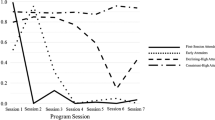Abstract
This study investigated the characteristics associated with program non- completion among families recruited for a family-based prevention program offered in the metropolitan Washington, D.C., area. Utilizing data obtained from interviews administered to eligible clients, descriptive statistics were calculated to determine whether or not the completers and non-completers differed in their responses to three sets of survey items (i.e., research, personal, and program factors). The general themes uncovered from the analysis of adult survey responses suggested that non-completers were misinformed about the content of the program, and lacked accessible transportation. Program content, family illness, and scheduling conflicts also contributed to non-attendance.
Similar content being viewed by others
REFERENCES
Biglan, A., H. Steveerson, D. Ary, C. Faller, C. Gallison et al. (1987). Do smoking prevention programs really work? Attrition and the internal and external validity of an evaluation of a refusal skills training program. Journal of Behavioral Medicine, 10, 159–171.
DeMarsh, J., and Kumpfer, K. (1986). Family-oriented interventions for the prevention of chemical dependency in children and adolescents. In S. Griswold-Ezekoye, K. Kumpfer, and W. Bukoski (Eds.), Childhood and chemical abuse: Prevention and intervention (pp. 117–152). New York: Haworth.
Ellickson, P., D. Bianca, and D. Schoeff. (1988). Containing attrition in school-based research. Evaluation Review, 12, 331–351.
Gottfredson, D., K. Kumpfer, D. Polizzi, D. Banks et al. (2000). The Strengthening Washington D.C. Families Project: Early Results from a Randomized Clinical Trial. Paper presented at the American Society of Criminology Conference: Atlanta, Georgia.
Hansen, W., L. Collins, C. Malotte, C. Johnson et al. (1985). Attrition in prevention research. Journal of Behavioral Medicine, 8, 261–275.
Hansen, W., N. Tobler, and J. Graham. (1990). Attrition in substance abuse prevention research. Evaluation Review, 14, 677–685.
Howard, K., M. Krause, and D. Orlinsky. (1986). The attrition dilemma: Toward a new strategy for psychotherapy research. Journal of Consulting and Clinical Psychology, 54, 106–110.
Johnson, C., W. Hansen, L. Collins, and J. Graham. (1990). Relative effectiveness of comprehensive community programming for drug abuse prevention with high risk and low risk adolescents. Journal of Consulting and Clinical Psychology, 58, 447–456.
Polizzi, D. (1999). Differentiating program completers from non-completers: An exploratory analysis of personal and program characteristics. Masters Thesis: University of Maryland at College Park.
Siddiqui, O., B. Flay, D. Phil, and F. Hu. (1996). Factors affecting attrition in a Longitudinal smoking prevention study. Preventive Medicine, 25, 554–560.
Snow, D., J. Tebes, M. Arthur, and R. Tapasak. (1992). Two-year follow-up of a social-cognitive intervention to prevent substance use. Journal of Drug Education, 22, 101–114.
St. Pierre, T., M. Mark, D. Kaltreider, and K. Aiken. (1997). Involving parents of high-risk youth in drug prevention: A three-year longitudinal study in boys and girls clubs. Journal of Early Adolescence, 17, 21–50.
Author information
Authors and Affiliations
Rights and permissions
About this article
Cite this article
Polizzi Fox, D., Gottfredson, D.C. Differentiating Completers from Non-Completers of a Family-Based Prevention Program. The Journal of Primary Prevention 24, 111–124 (2003). https://doi.org/10.1023/A:1025988227486
Issue Date:
DOI: https://doi.org/10.1023/A:1025988227486




